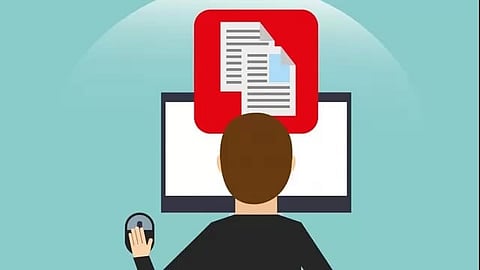Our desks and cupboards are often a mess with documents of all kinds, and we often tend to misplace them. This could prove to be quite a hassle, especially if the said documents happen to be either our financial records or our medical documents.
Store Your Financial Documents Digitally With Ease
Digitising your documents will help you in the long run. Here’s how you can proceed with storing them digitally.
However, you can now make your life a bit easy by storing these documents safely and securely online, and retrieve them whenever required.
Says Nita Menezes, founder and CEO, Financially Smart, an edutech firm: “Digital storage of financial documents helps with anytime and anywhere access in the case of an emergency or during travel etc. Some of documents can form a part of your legacy, and digital Will, as well. It also helps as a backup for your physical documents, in case of loss, theft, fire, etc.”

There are several Apps available on Google Play as well as the Apple Store where one can store these documents. Some of the more popular ones are Dropbox, Google drive, Evernote, One Drive, Google Docs, etc.
One just needs to scan and upload their financial documents on these Apps. The documents are safely stored in the cloud, and there is no chance of them getting lost. These can be easily retrieved as and when needed. There is also DigiLocker, a simple and secure document wallet provided by the Government of India that allows Indian citizens to store their documents digitally on the wallet.
DigiLocker is a key initiative under the Digital India drive, the Government of India’s flagship program aimed at transforming India into a digitally-empowered society and knowledge economy.
A beta version of the same has already been released by the department of Electronics and Information Technology (DeitY), Government of India. It is aimed at minimising the usage of physical documents and enable sharing of e-documents across agencies.
“With the help of this portal, the sharing of e-documents will be done through registered repositories, thereby ensuring the authenticity of the documents online. Residents can also upload their own electronic documents and digitally sign them using the e-sign facility. These digitally signed documents can be shared with government organisations or other entities,” says Menezes.
Menezes, however, advises using separate folders for important documents.
“Do not scan every document, but only the important ones that are needed, and use different folders for them. Depending on the extent of your family’s financial documents, you could create a series of folders and subfolders within your storage service for organising them,” adds Menezes.
For instance, important documents like Aadhaar, PAN, and Passport can be kept in a personal folder. Home loan agreement, insurance policies, and investment related documents, can be kept in a different folder. Name them and use key words for retrieving them easily through the search option when you need them. Also, choose your password smartly and don’t forget it.
While documents can be scanned through Apps on your phone, it would be better to invest in a document scanner for clearer copies. Once you have stored your documents digitally, you will never have to worry again about finding them when you need them.